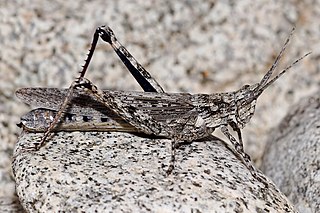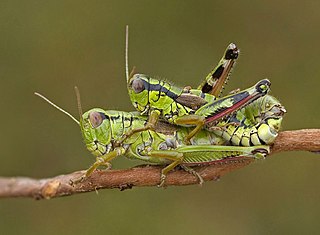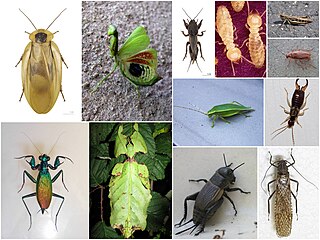
Insects in the family Tettigoniidae are commonly called katydids, or bush crickets. They have previously been known as "long-horned grasshoppers". More than 8,000 species are known. Part of the suborder Ensifera, the Tettigoniidae are the only extant (living) family in the superfamily Tettigonioidea.

Orthoptera is an order of insects that comprises the grasshoppers, locusts, and crickets, including closely related insects, such as the bush crickets or katydids and wētā. The order is subdivided into two suborders: Caelifera – grasshoppers, locusts, and close relatives; and Ensifera – crickets and close relatives.

Acrididae, commonly called short-horned grasshoppers, are the predominant family of grasshoppers, comprising some 10,000 of the 11,000 species of the entire suborder Caelifera. The Acrididae are best known because all locusts are of the Acrididae. The subfamily Oedipodinae is sometimes classified as a distinct family Oedipodidae in the superfamily Acridoidea. Acrididae grasshoppers are characterized by relatively short and stout antennae, and tympana on the side of the first abdominal segment.

Ensifera is a suborder of insects that includes the various types of crickets and their allies including: true crickets, camel crickets, bush crickets or katydids, grigs, weta and Cooloola monsters. This and the suborder Caelifera make up the order Orthoptera. Ensifera is believed to be a more ancient group than Caelifera, with its origins in the Carboniferous period, the split having occurred at the end of the Permian period. Unlike the Caelifera, the Ensifera contain numerous members that are partially carnivorous, feeding on other insects, as well as plants.

Bandwings, or band-winged grasshoppers, are the subfamily Oedipodinae of grasshoppers classified under the family Acrididae. They have a worldwide distribution and were originally elevated to full family status as the Oedipodidae. Many species primarily inhabit xeric weedy fields, and some are considered to be important locusts:

Acridoidea is the largest superfamily of grasshoppers in the order Orthoptera with species found on every continent except Antarctica.

Oedipoda is the type genus of grasshoppers, in the subfamily Oedipodinae, mostly from the Palaearctic realm. The type species is the European "blue-winged grasshopper", Oedipoda caerulescens.

Eumastacidae are a family of grasshoppers sometimes known as monkey- or matchstick grasshoppers. They usually have thin legs that are held folded at right angles to the body, sometimes close to the horizontal plane. Many species are wingless and the head is at an angle with the top of the head often jutting above the line of the thorax and abdomen. They have three segmented tarsi and have a short antenna with a knobby organ at the tip. They do not have a prosternal spine or tympanum. Most species are tropical and the diversity is greater in the Old World. They are considered primitive within the Orthoptera and feed on algae, ferns and gymnosperms, the more ancient plant groups.

Cycloptera is a South American genus of bush crickets in the subfamily Pterochrozinae.

Typophyllum is a genus of Neotropical, leaf-mimicking katydids or bush crickets belonging to the subfamily Pterochrozinae.

Anacridium is a genus of "tree locusts" or "bird grasshoppers" belonging to the subfamily Cyrtacanthacridinae.

Lesina is a genus of bush cricket in the tribe Agraeciini. Species in this genus are known as 'dragon headed katydids'. They are native to tropical Asia including Malaysia, Indonesia and Borneo.

The Trigonopterygoidea are an insect superfamily in the Orthoptera: Caelifera. Sometimes described as leaf grasshoppers, American species in the Xyronotidae have also been called razor-backed bush-hoppers.

The Cyrtacanthacridinae are a subfamily of Orthoptera: Caelifera in the family Acrididae. They are sometimes referred-to as bird locusts, criquets voyageurs in French-speaking Africa, and Knarrschrecken in German.

Austracris is a genus of Orthoptera: Caeliferan insect in the family Acrididae: subfamily Cyrtacanthacridinae. It includes an Australian pest, the spur-throated locust.

Patanga is a genus of grasshoppers in the subfamily Cyrtacanthacridinae. Species are distributed throughout Asia: from India, China, Japan, Indochina and western Malesia. The genus was named by Boris Uvarov in 1923, with the type species the economically significant Bombay locust: which has also been placed in genus Nomadacris.

The Lentulidae are a family of flightless grasshoppers found in sub-Saharan Africa.

The cohort Polyneoptera is a proposed taxonomic ranking for the Orthoptera and all other Neopteran insects believed to be more closely related to Orthoptera than to any other insect orders. These winged insects, now in the Paraneoptera, were formerly grouped as the Hemimetabola or Exopterygota on the grounds that they have no metamorphosis, the wings gradually developing externally throughout the nymphal stages.

The Pterochrozinae are a subfamily of the Tettigoniidae found in Central and South America. They were previously placed as a tribe in the subfamily Pseudophyllinae and have been called "leaf-mimic katydids".

Prionotropis is a genus of grasshoppers in the family Pamphagidae. Most described species of Prionotropis are found in southern Europe.



















